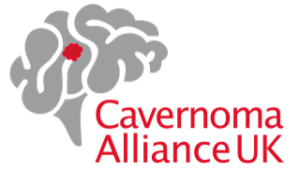Cavernomas: A Randomised Effectiveness (CARE) Study
Recruitment

We expect recruitment to start from June 2021 onwards and to last until the end of November 2022.
If you wish to be considered for the study, you should check your eligibility and you need to have an appointment with the Research Team at one of the Study Sites.
This can happen in one of three ways:
- If you are under the care of a doctor at one of the Study Sites, you need to discuss taking part with that doctor, who may refer you to the Research Team.
- If you are under the care of a doctor at a hospital that is not a Study Site, then you must ask your doctor to refer you to the Principal Investigator at a Study Site. Details of who is who and how to make contact with each active Study Site are to be found on the Edinburgh Clinical Trials Unit (ECTU) CARE Site website
- If you need help with navigating either of the above routes, then the CAUK Helpline team can help you.
For more information on the importance of Randomised Controlled Trials (RCT), please visit our RCT Resources here.
Eligibility
Who can take part?
Patients who have had symptoms due to stroke or epilepsy from a brain cavernoma, when they and their doctor are uncertain about whether to use Treatment without surgery or Treatment including surgery for the cavernoma that has caused symptoms, following consultation with a neurosurgeon.

Participants should be:
- Any age
- Have at least one brain cavernoma which has caused stroke-like symptoms or epilepsy. There is no time limit on when they first had symptoms or a diagnosis of cavernoma.
- Patient has mental capacity to consent for themselves (adults or young person with capacity) or parent/legal guardian provides consent (children).
- If a patient has multiple brain cavernomas, at least one of which must have caused symptoms and not been removed or obliterated by brain surgery or focused radiation treatment.
- If a patient has previously had surgery for their cavernoma (with brain surgery or focused radiation treatment), the cavernoma must not have been completely removed or obliterated.
Who cannot take part?
- People with spinal cavernomas only.
- Brain cavernoma with no symptoms.
- Already had brain surgery or focused radiation treatment for a single cavernoma which led to complete removal/obliteration.
- Already randomly allocated to treatment without surgery or treatment with surgery in the CARE Study.
- Not living in the UK or Ireland.

